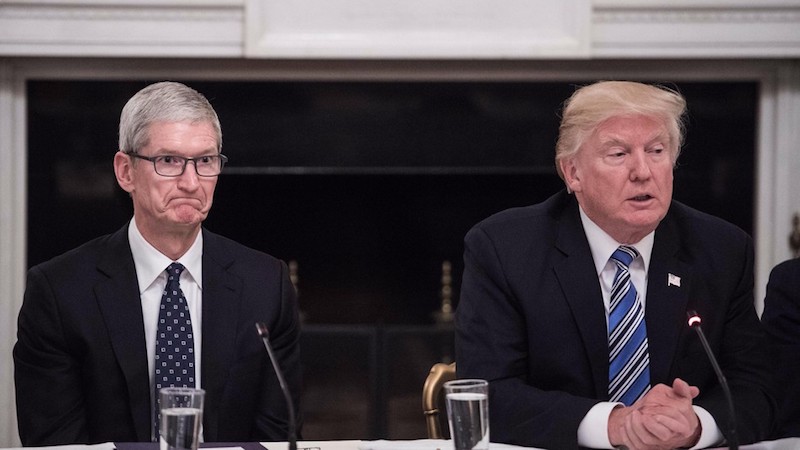Trump Administration Reignites Criticism of Apple's China Dependence
Apple Under Fire: The Ongoing Debate Over iPhone Manufacturing
Apple once again finds itself in the crosshairs of the Trump administration, specifically regarding its extensive reliance on Chinese manufacturing. Senior trade advisor Peter Navarro publicly lambasted CEO Tim Cook for the company's failure to significantly shift iPhone production to the United States.

Navarro's Criticism and Apple's Response
During a CNBC interview on "Squawk on the Street", Navarro vehemently criticized Apple's global manufacturing strategy, highlighting its continued dependence on China for iPhone production. He accused Tim Cook of dragging his feet on relocation efforts, asserting that Apple hadn't made sufficient progress:
Going back to the first Trump term, Tim Cook has continually asked for more time in order to move his factories out of China. I mean, it's the longest running soap opera in Silicon Valley. And my problem with Tim Cook is he never takes the steps to actually do that. And with all these new advanced manufacturing techniques and the way things are moving with AI and things like that, it's inconceivable to me that Tim Cook could not produce his iPhones elsewhere around the world and in this country.
Navarro's statement paints a picture of inaction on Apple's part, suggesting a lack of commitment to shifting production away from China. However, the reality is far more complex.
The Complexities of Reshoring iPhone Production
Numerous industry analysts and economists have cautioned against the simplistic notion of reshoring Apple's production entirely to the United States. They highlight significant logistical, economic, and labor-related hurdles. Apple's supply chain is incredibly intricate, sourcing thousands of components from over 40 countries. Simply relocating this complex network would be a monumental undertaking.
The cost of manufacturing in the US is significantly higher than in China. Labor costs, energy prices, and regulatory compliance all contribute to a considerably more expensive production environment. This cost increase would likely translate to significantly higher iPhone prices, potentially impacting consumer demand and Apple's profitability.
Furthermore, the skilled labor needed for iPhone assembly is not readily available in the US at the scale required. Training a workforce of the necessary size and expertise would take years and would present a substantial financial burden for Apple. Finding a workforce sufficient to meet the demands of high-volume iPhone production would also be challenging.
The existing infrastructure in the US to support such a massive shift is also lacking. China has developed a highly specialized ecosystem of suppliers, logistics networks, and manufacturing expertise specifically tailored to the electronics industry. Replicating this infrastructure in the US would require massive investment and would take a considerable amount of time.
The Broader Context of Trade Tensions
Navarro's comments arrived amidst the Trump administration's preparation to impose fresh tariffs. These tariffs followed the expiry of a 90-day tariff pause initiated in April 2025, a period intended for negotiation of updated trade agreements with key manufacturing nations.
While some countries reached partial agreements during this period, others now face new tariffs ranging from 10% to 40% on exports to the United States. This highlights the broader context of heightened trade tensions between the US and several key manufacturing economies.
The imposition of these tariffs directly impacts companies like Apple, adding to the already considerable complexities of their global supply chain. It creates additional pressure to consider alternatives to manufacturing in countries facing these tariffs, but the move is not as simple as Navarro suggests.
The Political Dimension
It's crucial to understand that the criticism leveled at Apple also has a political dimension. The Trump administration frequently emphasized "bringing jobs back to America," making it a central theme of its economic policy. Targeting companies like Apple, which represent significant manufacturing abroad, served as a powerful symbol of this policy.
While the stated goal was to boost domestic manufacturing and reduce reliance on foreign production, the implications were far-reaching. The pressure exerted on Apple and other multinational corporations highlighted the potential conflict between economic pragmatism and political expediency. The complexities of global supply chains and the nuances of international trade were often overlooked in the pursuit of short-term political gains.
A Balanced Perspective
While the desire to boost domestic manufacturing and create American jobs is understandable, the complexities involved in reshoring Apple's production should not be underestimated. The economic, logistical, and labor-related challenges are substantial. A simple relocation is not a viable solution in the short term.
While the criticism of Apple's reliance on China is valid from a political perspective, a balanced assessment must acknowledge the inherent challenges in significantly altering a global supply chain of such magnitude and complexity. A more nuanced approach that considers both the political and economic realities is essential for effective policymaking.
The debate surrounding Apple's manufacturing strategy underscores the intricate relationship between global trade, political priorities, and the challenges faced by multinational corporations operating in a complex and increasingly volatile international landscape.
This article, "Trump Administration Reignites Criticism of Apple's China Dependence" first appeared on MacRumors.com
Discuss this article in our forums
from MacRumors
-via DynaSage

